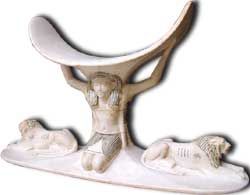Shu - First off the name. Does this work if we are comparing the Hebrew to the Egptian? One thinks of the shortened form, "Yeshu," found in some Jewish texts. "Shu" is thought to mean "dry", "parched," or "withered," but it is also suggested that the name may mean "He Who Rises Up." Shu was thought to be the "breath of life" for all creation.
Shu is the Egyptian god of light, wind, (cool, dry) air, and the atmosphere. Also of "emptiness." He separates the heavens from the earth, which are personified as his children, Nut and Geb. Thus, he is a figure remeniscent of Atlas and is often depicted bearing the load of the heavens on his arms and shoulders, in a pose which evokes comparisons to imagery of the crucified Jesus. As the wind, he was also relied on by sailors to guide them to safety.

As the son of the sun, Atum (and Ra), the creator god, Shu is born of this deity's breath or via masturbation, along with his sister Tefnut, who is the godess of moisture. When Akhenaten experimented with monotheism, Shu still maintained a prominant position, as the living Pharoah was believed to embody him.
Shu aided the souls of the dead in their ascent to heaven, "The Land of Light," by providing a giant ladder. He was also the judge of the dead in the Halls of Ma'at and oversaw the punishment of the wicked.
His main sanctuary was at "El Yahudiya" aka The Mound of the Jews situated in Leontopolis, coincidentally where Onias the IV (or 3rd?) established a replica of the Jewish temple. He was worshipped here in the form of a lion, as he represented the sun's light and was also the protector of the sun and the one who resurrected Ra each morning, holding power over snakes, who represented the demon Apep. One text connects him to the cat god, Basti and his sister Tefnut to the cat goddess of ointment and sexuality, Bast.
I might go on drawing some specific parallels, in particular to Johanine Christianity and Philonic concepts, but perhaps it would be more useful to simply ask if anyone else is seeing any parallels here. I need yet to get to an actual a library to verify some of these facts, but here are the websites I've drawn this information from. Constructive criticism is welcome, but please keep it respectful.
http://www.ancientegyptonline.co.uk/shu.html
http://en.wikipedia.org/wiki/Shu_(Egyptian_deity)
http://www.thekeep.org/~kunoichi/kunoic ... Ge3OPnF_Gh
